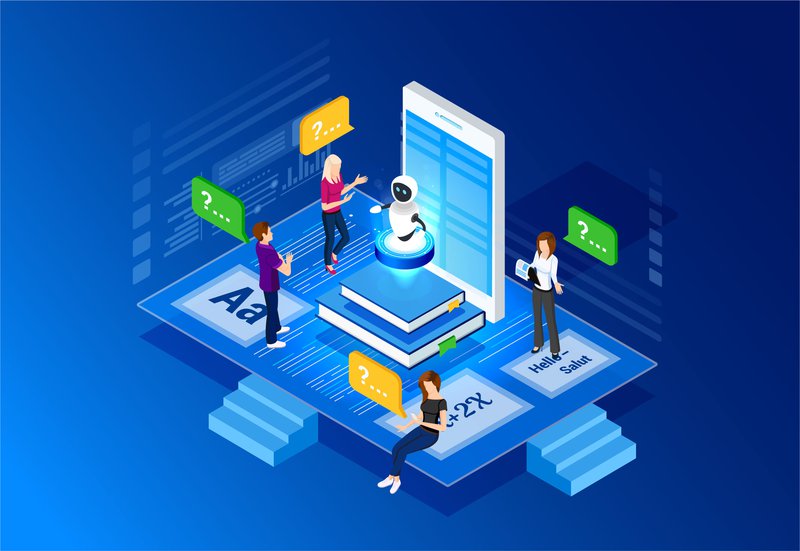
AI in education
Is AI (Artificial Intelligence) really helpful? Here are just a few ways AI can solve the problems within the education system.

Chatbots and Virtual Assistants 🤖
AI-based chatbots and visual assistants are critically vital for improving students’ learning experiences. Since these tools able to fulfil student's requirements at any time because chatbots are able to answer students and provide appropriate responses.
 |
Late reply |
Unlike the past, students may not get a response instantly as teachers are not able to be online 24/7.
- As a result, teachers are able to understand students more deeply so that able to provide a better solution to students.
 |
| ChatGPT |
- To quate an example for chatbots and virtual assistants are google assistant, chat GPT, chat Sonic etc.
Enhance Learning Tools 🧰
Enhance learning tools such as Intelligent Tutoring System (ITS) are AI-driven platforms designed to provide personalized instruction and feedback to students.
- These systems adapt to individual needs through adjusting the difficulty and type of content based on the student’s progress and understanding.
- Furthermore, systems provide instant feedback on assignments and practice exercises, helping students learn from their mistakes immediately.
- For further understanding, students can process through tutoring which solves the questions step-by-step. - How effective are intelligent tutoring systems? (n.d.).
Apart from that, AI also plays an important role in language learning as well.
- To illustrate this point, Natural Language Processing (NLP), which understands and processes human language, allows it to provide accurate translation, grammar corrections and suggestions for improvement.
- Moreover, some conversational agents that simulate real-life conversations provide an opportunity for students to practice speaking and listening in a new language. - Neurond. (n.d.-b). Leverage Natural Language Processing in Education - NeuronD.
Besides, AI tools support students and researchers in finding and organizing information.
- For example, search engines nowadays use AI to provide more accurate and relevant search results, making research more efficient.
- In this context, AI automatically summarizes large volumes of text, helping students understand the key points of lengthy documents quickly. - AI Search in Education: The Rise of Intelligent Learning. (2023, June 23). Cactusai.
TP078618 Kok Sze Jun
Personalized learning and skill development
In personalized learning path, Ai algorithms analyse individual learning styles, preferences and performance data which content educational and it help to fulfil each of the student’s requirement.
- This is to ensure that students can overcome a variety of problems through AI.
Furthermore, AI–based learning systems can be fitted to each student's individual needs, allowing them to learn with a comfortable environment, pace and style.
- This would increase the efficiency of the teaching process and help enhance learning engagement among students.
Moreover, students can develop a skill for instance programming, since AI offers basic and complex code for students to do coding with themselves.
TP079062 Loo Qi Heng
AI Detection Tools
As useful as AI tools can be in aiding students in a multitude of ways, an overreliance on AI tools can easily lead to students not learning anything significant.
 |
| Copyleaks AI Detector |
 |
| GPTZero AI Detector |
That is why it is also important for teachers and lecturers to have their tools to make sure that the students are not just relying on AI to create their work but instead to improve their work.
AI Detection tools are slowly getting better, with the ability to detect whether the student’s work is partially or maybe even entirely generated by an AI (Caulfield, 2023).
It is to be noted that the teachers and lecturers should refrain from taking the result of the detection at face value, considering how many factors are in play when detecting AI (Sunil, 2023).
Teachers and lecturers are expected to use their knowledge of the student’s performance and understand the obvious signs of AI-generated content (such as the fonts, wording of certain sentences, out-of-context topics, etc) to make their final judgment.
Another subset of AI detection is plagiarism detection, which is much more reliable in terms of accuracy, with the added power of AI, it is only getting quicker and easier to detect any kind of plagiarism (AIContentfy team, 2023).
TP078750 Matthew Austin Widjaja
🕝Time management skill📅
According to research conducted in 2023 about time management, approximately 82% of people do not follow or have a time management system. Time management is an important skill to everyone, and this skill will affect how we do things and our future.
Previously, before the rise of artificial intelligence, the process of creating a time management system sounded like tedious work for many but now this process can be simplified with the help of AI tools or apps.
Most students suffer from a lack of time management skills, which will result in procrastination, stress from the work accumulated and falling behind classes. Thus, it is important that students start to learn this skill from a younger age.
Apps such as Motion can help everyone, including students, to plan their schedule automatically with the power of AI.
 |
| Motion official website |
These apps will help students to increase their overall productivity throughout the day and not miss any deadlines by making sure the user is always on track.
Based on the user, it will also prioritise the more important tasks and schedule the least important task towards the end.
After some time of using these time management apps, students will also be able to master the skills needed to manage their own time, which will greatly benefit them in the future.
TP072186 Lim Zheng Xian
Language Learning 💭
In the language learning sector, artificial intelligence offers a more personalized learning environment for the user that could analyse the user’s strengths, limitations, learning pace and preferences.
- Since you can access the internet from anywhere artificial intelligence may potentially improve the user’s accessibility.
- Financial obstacles are further reduced when high-quality AI-driven tools are affordable or free to use, enhancing accessibility and inclusivity for language learners worldwide. Artificial intelligence provides the need for real-time correction.
- For instance, when a user finishes a speaking or writing exercise artificial intelligence can evaluate the response right away, point out specific mistakes and provide corrections.
Despite its many advantages, artificial intelligence in language learning has several drawbacks.
- The absence of human connection is one of the main disadvantages when artificial intelligence learning is.
- Human connections act as a main part throughout learning conversational techniques and cultural quirks, which is one of the main problems.
- Moreover, context and subtleties in language may be difficult for AI systems to understand, which could result in inaccurate or simplistic responses.
- Other than that, these systems could potentially reinforce and magnify biases found in the training data and produce recommendations for language usage that are improper.
- A further concern is that students may be overly reliant on artificial intelligence tools and fail to acquire the necessary language abilities on their own.
References
- Caulfield, J. (2023, September 6). How do AI detectors work? | Methods & Reliability. Scribbr. https://www.scribbr.com/ai-tools/how-do-ai-detectors-work/
- Sunil, R A. (2023, November 6). The truth about AI detectors - More harm than good. Prompt Engineering. https://promptengineering.org/the-truth-about-ai-detectors-more-harm-than-good/
- Team, A., & Team, A. (2023, March 5). The role of AI in content plagiarism detection. AIContentfy. https://aicontentfy.com/en/blog/role-of-ai-in-content-plagiarism-detection#:~:text=AI%20algorithms%20that%20can%20recognize,user%2Dfriendly%20in%20the%20future.
- How effective are intelligent tutoring systems? (n.d.-b). https://www.apa.org. https://www.apa.org/pubs/highlights/spotlight/issue-37
- Neurond. (n.d.-b). Leverage Natural Language Processing in Education - NeuronD. https://www.neurond.com/blog/natural-language-processing-in-education#:~:text=Benefits%20of%20Natural%20Language%20Processing%20in%20Education%201,Support%20. . .%206%206.%20Ease%20of%20Development%20
- AI Search in Education: The Rise of Intelligent Learning. (2023, June 23). Cactusai. https://www.cactusai.io/stories/ai-search-in-education-the-rise-of-intelligent-learning
- Goyal, P., Minz, N. K., & Sha, A. (2023). Chatbots and Virtual Assistants in Education: Enhancing student support and engagement. ResearchGate. https://www.researchgate.net/publication/377188367_Chatbots_and_Virtual_Assistants_in_Education_Enhancing_Student_Support_and_Engagement#:~:text=The%20chatbot%20and%20virtual%20assistance,with%20the%20help%20of%20AI.






Comments
Post a Comment